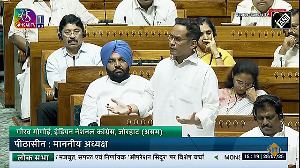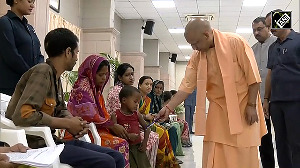 The Central Bureau of Investigation is likely to chargesheet telecom operators Bharti Airtel (earlier known as Bharti Cellular) and Vodafone India (earlier known as Hutchison Max & Sterling Cellular) in the first week of October in a case related to additional spectrum allocation in January 2002, according to senior officials of the investigative agency.
The Central Bureau of Investigation is likely to chargesheet telecom operators Bharti Airtel (earlier known as Bharti Cellular) and Vodafone India (earlier known as Hutchison Max & Sterling Cellular) in the first week of October in a case related to additional spectrum allocation in January 2002, according to senior officials of the investigative agency.
This would be the first time in the 2G spectrum allocation case that the role of the Bharatiya Janata Party-led National Democratic Alliance government will come under scrutiny.
The telecom minister in 2002 was Pramod Mahajan, who was killed in 2006.
In the course of the investigations, CBI has found irregular allocation of additional spectrum beyond 6.2 MHz to 10 MHz to GSM operators, including Bharti and Vodafone during Mahajan's rule.
The agency has alleged favouritism and arbitrariness by some officers in the department of telecommunication, bypassing the opinions of the member (finance), the wireless adviser and even the highest decision-making body in the DoT, the Telecom Commission.
Apart from the telecom companies, CBI is also building a case against senior government officials who were involved in the decision making process at the time.
The agency is expected to charge the accused telecom companies under Section 120-B and 420 of the penal code and the government officials are likely to be charged under section 13 (2) and section 13(1) (d)
The investigating agency had registered a case against Shyamal Ghosh, the then telecom secretary, and has found that the senior officer, along with other DoT officials, had bypassed the wireless advisor and a technical committee at DoT on the issue of pricing and allocation of additional spectrum to telecom companies.
CBI, in its FIR of November 2011, alleged that Ghosh and other DoT officials caused loss to the exchequer and a corresponding gain to Bharti Airtel and Vodafone.
The agency had then said that Ghosh along with the then DDG telecom, J R Gupta, and the beneficiary companies, approved the allocation of additional spectrum up to 10 MHz at minimal incremental revenue share, when even 8 MHz was not justified on the recommendations of the technical committee.
According to CBI, this caused an 'undue pecuniary benefit of Rs 506 crore (Rs 5.06 billion)' to the beneficiary companies which the department of telecom would have earned.
CBI alleged Ghosh had 'dishonest intentions' when he did not seek any justification from the technical committee in effectively bringing down the requirement of subscriber base from 0.9 million to 0.4 to 0.5 million for the allocation of additional spectrum.









